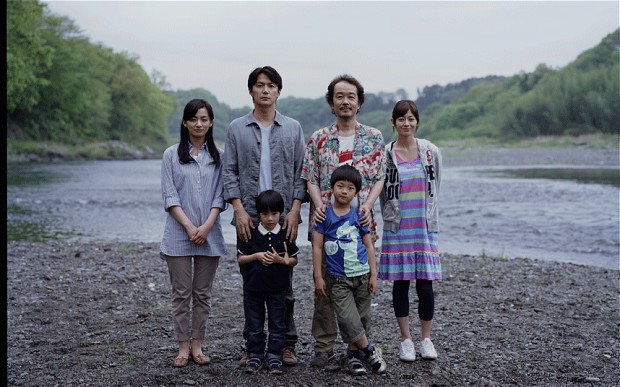Koreeda is superb at building empathy for his characters, particularly in getting the viewer to understand Ryota's motives. Keita isn't excelling like Ryota expects, and the baby-swapping gives him the confirmation he's been hoping for. Maybe the mediocrity of this kid isn't a reflection on me at all. Maybe the distance in our relationship isn't a function of the fraction of time I spend at home. That's an ice-cold sentiment, especially after raising Keita as his own for seven or eight years, and it's to Fukuyama's credit that the viewer never completely turns against Ryota. Any parent surely has some concern or doubt that they're fouling up their progeny, and Ryota is fairly certain he's done just that. The hospital's mistake allows him a do-over and absolves him of his perceived failure. Koreeda identifies this taboo feeling and finds a way to explore it.
Ryota's concerns are compounded by seeing the polar opposite parenting style of Yudai, who wrestles on the floor with Ryu and his two other children in public. As the families explore their options and each boy sleeps over at the other family's home, Yudai is able to immediately charm Keita, making him smile in a way that Ryota maybe never has been able to. Parenting is like any other skill in that some fathers are going to be better at some facets than others, and while Ryota is an excellent provider, he cannot support the emotional life of a child in the way Yudai can. His initial response to this counter-example is to put it out of sight and mind, instead of having the humility to perhaps acknowledge an alternative to seeing economic support as the end-all and be-all of a father's responsibilities.
Ryota gets much of the focus in Like Father, Like Son, but Koreeda has fashioned the rest of the cast into full characters as well. Yudai is not only the sloppy man-child that Ryota initially sees him as, revealing himself to also be loyal and loving. Koreeda juggled a large cast of kids in I Wish, and it was never in question that Keita and Ryu would give anything comfortable and naturalistic performances. The viewer is easily endeared to both characters as they put an uncertain foot into new waters, both scared and intrigued by their new potential families. Midori is a compelling contrast to Ryota, and the person responsible for how big-hearted a child her son has turned into. Despite how far apart they are from their desired resolutions to the central problem, she and Ryota form a recognizable partnership.
Like Father, Like Son deals in big feelings of familial love, asking whether or not genes alone make one worthy of such a gift. For Ryota, the answer is yes, but for Yudai and Midori, the answer is an emphatic no. The path Ryota takes in this film gets him closer to no, and it's an affecting experience watching him get there. B+

 RSS Feed
RSS Feed